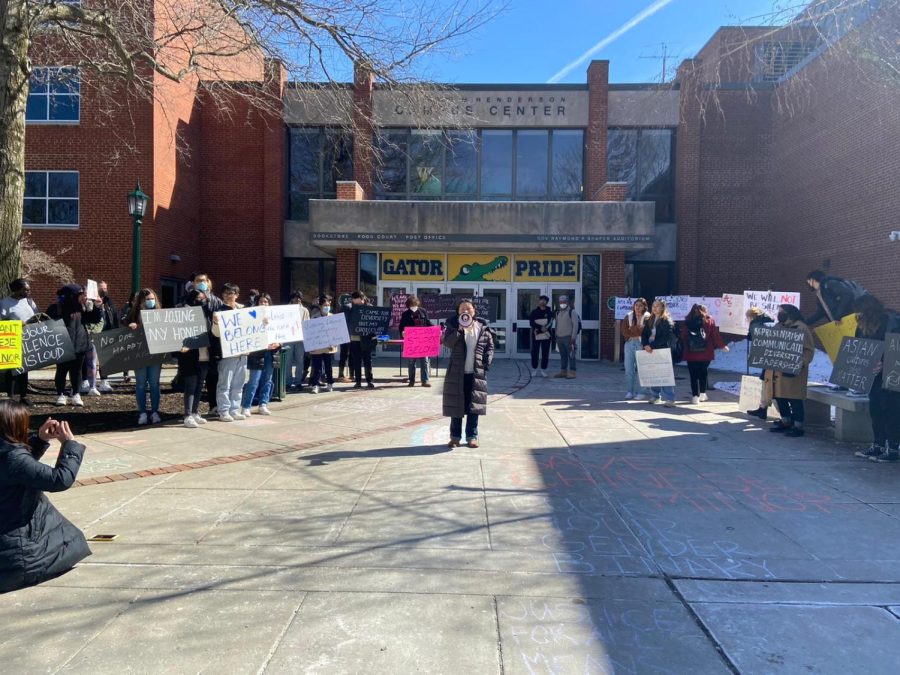Students march into Bentley in support of Chinese minor
Students and members of the Allegheny College community gathered outside the Henderson Campus Center on Friday, March 4, to peacefully protest the elimination of the Chinese minor from the curriculum at Allegheny College.
The protest was organized by the Association for Asian and Asian-American Awareness and began at noon.
Attendees of the protest held colorful banners and signs that expressed their joint distress and criticism toward the college administration. Some banners read messages such as “no one is happy at Allegheny” and “silence is the norm here.”
During the protest, A5 President Peter Alegre, ’23, informed those present of a fundraising page he had created for Associate Professor of Chinese Xiaoling Shi to obtain legal advice regarding the appeal process of her impending termination from staff.
Over $3,500 of the $5,000 fundraising goal has been collected, as of Thursday night.
Many across the student body showed their support for the members of A5, who took turns to address the gathering regarding the issue. One such student was Difei Chen, ’25, who voiced his concerns to the crowd about the representation of Chinese students and culture at Allegheny.
“There are currently over 10 Chinese students on campus,” Chen said. “We are concerned about the college’s attitude towards international students as we don’t want to feel unwelcome here because that’s how we’re currently feeling.”
Chen also mentioned that several students expressed their concerns to Provost and Dean of the College Ron Cole, ’87, during his office hours.
“When we told (Cole) that Asian and Asian-American students feel as if we’re losing our belonging he simply said, if someone came to Allegheny expecting to study Chinese then they shouldn’t have come here,” Chen told audience members. “I thought it was very inappropriate of him to say something like that in the presence of Asian and Asian-American students.”
Over 50 members of the Allegheny community, including students and faculty, were present at the protest.
Alegre criticized the general lack of communication he believes to exist between the student body and the administration.
“I don’t see a single person from the administration (at the protest),” Alegre said. “For the past few years, this college’s message has been one of austerity. It exists in the rise in meal plans and housing fees, the elimination of academic programs, there’s just no end to it.”
Alegre disclosed that Stanfield Professor of Asian Studies of Williams College Cornelius Kubler wrote a letter to President Hilary Link advising against the elimination of the Chinese minor.
Kubler’s letter stated, “while I am in no position to understand all of the factors involved in your decision, I am concerned that at a time when many other American institutions of higher education are diversifying and internationalizing their curricula, Allegheny College seems to be moving in the opposite direction.”
Kubler’s letter also spoke to Shi’s credibility as professor and impact on the Asian-American population at Allegheny. According to Kubler, “(Shi) is highly regarded in Chinese studies circles in (the United States) and overseas.”
Alegre voiced his gratitude to the student body and the wider Allegheny community for supporting the efforts to reinstate the Chinese minor and Shi.
“Recently, I’ve seen people get together and support all sorts of different causes but I’m surprised yet grateful at the amount of support people have shown,” Alegre said. “And it’s not just the students, it’s also faculty members, community partners and even alumni.”
Nahayan Minhas, ’24, noted that such gatherings are an effective way to build support systems and enhance empathy across campus.
“I wasn’t initially aware of the elimination of the Chinese minor until I came across this protest on my way to work today,” Minhas said. “But that’s the great thing about it because I stopped by which has helped me realize how others are impacted by a change that might not be news to others.”
Later, the protestors marched to Bentley Hall and entered with their signs and proclamations of “ho ho, hey hey, Chinese language has got to stay” and “diversity and inclusion is not this institution.”
Meanwhile, Shi has been collecting data that provides evidence regarding the productivity of the Chinese program.
“When the college’s enrollment was 2,100 students, we were expected to have a minimum of six students enrolled in Chinese classes,” Shi said. “Applying that same logic, now that the college has an enrollment of 1,600 students, the expected number should be around 4.57.”
The rate of drop of enrollment at Allegheny from 2012 to 2021 is 3.57% whereas the rate of drop of enrollment in the Chinese department during the same period is only 1.09%.
However, in a Feb. 16 article published in The Campus, Cole said the decision was made based on enrollment data and rates of under-enrollment not factored into the Academic Program Review Task Force’s report. He added that reductions will also be made in French and classical studies, programs noted as having “challenges to sustainability” by the Academic Program Review.
“Students were not taking Chinese consistently, particularly at upper levels,” Cole said at the time. “The (Task Force) report didn’t have details about the number of courses that were under-enrolled or canceled. It didn’t have that fine of detail, only the total enrollments in each major or minor. A position in French is being reduced, and there are going to be changes in the offering of Latin as part of classical studies.”
Cole did not respond to repeated requests for comment on this story.
More information regarding enrollment rates can be found on the Allegheny College website.
Shi also expressed her distress regarding the repercussions of the elimination of the Chinese minor on the Asian and Asian-American students on campus.
“I’m not upset about losing my job or anything related to me, but I am worried about the students on campus who come from minority backgrounds,” Shi said. “This taking away of identity and representation is particularly alarming at this point as the world is becoming more and more interconnected.”
Shi reinforced that the college is losing tradition and failing to keep up with the political climate and pace of the world. Shi also referred to data from the Pew Research Center which estimates that the United States’ Asian population will grow four times from its current size of roughly 22 million. It is estimated that the Asian population will surpass 46 million by the year 2060.
“In the near future, one in five Americans will be foreign-born and this will be reflected on college campuses,” Shi said. “It is a shame that Allegheny is disassociating itself from such an integral part of world culture at such a period of growth in intercultural discourse.”
Shi said that Chinese is a fundamental language and should be encouraged in the curriculum rather than being eliminated from it because it is so commonly spoken across the world.
Shi said that she reached out to her colleagues and students for advice regarding her situation.
“I was advised by everyone I spoke to that getting legal advice was the best step I could take,” Shi said.
It is unclear when the Board of Trustees will make a decision on Shi’s appeal.
Minhas believes a lack of student-administration communication has caused many students to feel the tension in the environment on campus. As such, messages like “f— Role Cole and Link” and “this school is a joke” were seen written in chalk on the Gator Quad during the protest and after.
“I just don’t feel like students have a lot of trust in the administration right now,” Minhas said. “To be fair, you can’t blame the students since the administration has made us feel avoided.”

Hassan Javed is a junior from Lahore, Pakistan. He is majoring in Communication and Media Studies while minoring in Psychology. This is his third year...

Sami Mirza is a senior from many different places. He is majoring in International Studies with a focus on the Middle East and North Africa and minor in...









